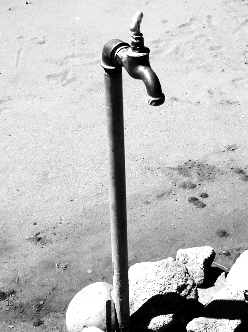Western choices leave the poor dry
 A new report has found food and clothing in Western countries is impacting water supplies for the world’s poorest.
A new report has found food and clothing in Western countries is impacting water supplies for the world’s poorest.
A new report by WaterAid (PDF) says high-income countries are buying products with very large ‘water footprints’ – the amount of water used in production - from water-scarce countries.
The experts say products with a particularly big water footprint include:
- a cup of coffee, which contains about 200 ml of actual water, yet the ground coffee takes 140 litres to produce. A cup of tea takes 34 litres per cup
- avocados require an average of 2,000 litres per kilogram to produce
- rice accounts for 40 per cent of all global irrigation, and 17 per cent of global groundwater depletion, with an average water footprint of 2,500 litres of water per kilogram
- cotton has a water footprint of 22,500 litres per kilogram in India, an average of 9,800 litres/kg in Pakistan and in the United States, about 8,100 litres
The high water footprint of these products is contributing to global issues of water scarcity, with close to 4 billion people living in water-scarce areas, where for at least part of the year water demand exceeds supply.
Even Australia is on track to face high water stress by 2040.
“Industrial and agricultural use of water should not be prioritised over people’s ability to get water daily for their basic needs - particularly with climate change making things worse,” WaterAid Chief Executive Rosie Wheen says.
She has called for change in the lead up to World Water Day, on Friday March 22.
“This World Water Day, we are more determined than ever to make clean water, decent toilets and good hygiene normal for everyone everywhere, by 2030,” Ms Wheen said.
“The global consequences of unequal access to water and rapidly growing water scarcity, fuelled by a growing demand on water resources and the impact of climate and population changes, underline the need for coordinated international action on water security.
“An urgent understanding is needed to ensure that the push for economic development through exports of food and clothing, do not imperil current and future generations’ access to water. There can be no sustainable economic development without sustainable and equitable access to water.”







 Print
Print